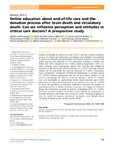Online education about end-of-life care and the donation process after brain death and circulatory death: can we influence perception and attitudes in critical care doctors?: a prospective study

Ver/
Use este enlace para citar
http://hdl.handle.net/2183/36065Coleccións
- Investigación (FFISIO) [503]
Metadatos
Mostrar o rexistro completo do ítemTítulo
Online education about end-of-life care and the donation process after brain death and circulatory death: can we influence perception and attitudes in critical care doctors?: a prospective studyAutor(es)
Data
2020-11Cita bibliográfica
Sandiumenge A, Lomero Martinez MDM, Sánchez Ibáñez J, Seoane Pillado T, Montaña-Carreras X, Molina-Gomez JD, Llauradó-Serra M, Dominguez-Gil B, Masnou N, Bodi M, Pont T. Online education about end-of-life care and the donation process after brain death and circulatory death. Can we influence perception and attitudes in critical care doctors? A prospective study. Transpl Int. 2020 Nov;33(11):1529-1540.
Resumo
[Abstract] Impact of training on end-of-life care (EOLC) and the deceased donation process in critical care physicians' perceptions and attitudes was analysed. A survey on attitudes and perceptions of deceased donation as part of the EOLC process was delivered to 535 physicians working in critical care before and after completion of a online training programme (2015-17). After training, more participants agreed that nursing staff should be involved in the end-of-life decision process (P < 0.001) and that relatives should not be responsible for medical decisions (P < 0.001). Postcourse, more participants considered 'withdrawal/withholding' as similar actions (P < 0.001); deemed appropriate the use of pre-emptive sedation in all patients undergoing life support treatment adequacy (LSTA; P < 0.001); and were favourable to approaching family about donation upon LSTA agreement, as well as admitting them in the intensive care unit (P < 0.001) to allow the possibility of donation. Education increased the number of participants prone to initiate measures to preserve the organs for donation before the declaration of death in patients undergoing LSTA (P < 0.001). Training increased number of positive terms selected by participants to describe donation after brain and circulatory death. Training programmes may be useful to improve physicians' perception and attitude about including donation as part of the patient's EOLC.
Palabras chave
Attitude
Critical care doctors
Donation after brain death
Donation after circulatory death
End-of-life care
Perception
Critical care doctors
Donation after brain death
Donation after circulatory death
End-of-life care
Perception
Versión do editor
Dereitos
Creative Commons Attribution Licence 4.0 International (CC-BY 4.0)
ISSN
0934-0874





